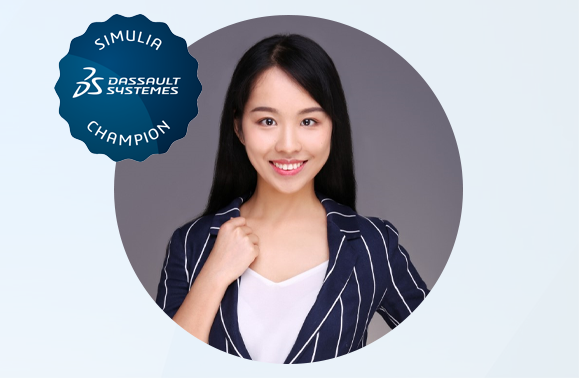Below is an excerpt from a recent interview with Alice Lin from Jabra, as she discusses her engineering journey and her passion for math and sciences and why she chose to use SIMULIA Abaqus simulation solutions to test the structural integrity and engineering design of headsets at Jabra.
Have you visited the SIMULIA Learning Community? Registration is free and includes access to hundreds of demos, tutorials, videos, documentation and more!
Q: Tell us about your background.
Alice Lin: When I was a child, I dreamt of being a scientist. I didn’t know the real difference between a scientist and an engineer when I was a child. A lot of people would tell me that girls are not good at physics and mathematics. So I think they were trying to persuade me to learn something more like art or language. But then I think to myself that I’m really interested in learning mathematics and physics, and I want to be a scientist or maybe a very excellent engineer. This career goal becomes more and more clear when I went to university when I start to learn solid mechanics or mechanical engineering. So I never doubted that I would become an engineer.
Q: So, at some point you became passionate about engineering?
Alice Lin: Yes, I think at first I was quite interested in learning about engineering because I can use what I learn to try to solve the real problems that are in real product designs. I think that is quite cool, although some people say, “okay, I think you are more suitable for a marketing job because you are always so talkative and you are so outgoing.” But I don’t think there is any conflict between engineering and good communication skills, because if you really want to be an excellent engineer, you need to apply some of the advanced technology or your experience to solve a problem. You still need excellent communication skills, and you also need to cooperate with others. So I don’t think that there is any prototypes to say, “Okay, your personality is not suitable for being an engineer. So actually, for me I always think engineering is quite cool work, and quite a cool job.
Q: You got your first start in engineering in aerospace industry aviation? Tell me about your first job in engineering and what you’re up to now.
Alice Lin: Yes. I mean, actually I have one year work experience as an aircraft designer, just after I got my bachelor’s degree. I think that was a really memorable experience because it’s so fantastic, you can see how you use technology. A lot of very advanced technology has been applied in the aerospace industry in the beginning. At that time, my major work was using CATIA. I was using CATIA to make a nice shape of the airplane. I think that is quite interesting. I feel I am like a painter. I’m also a little related with art design, but also you need to consider the structure and safety and you have to consider the CFD and whether the shape has good aerodynamic performance. So I think also we can see a lot of very advanced manufacture pro- method or process when I am working in that factory.
Q: Tell us how you transitioned from aerospace to personal headsets and what they have in common.
Alice Lin: Well, I really think this is quite an interesting problem. A lot of people have asked me this question before. I think I totally can understand, because for them it looks like aerospace and the headsets are totally two different things. But for me, I mean, for a simulation engineer they are quite similar in many ways because mechanics, I don’t think it is just specific for any industry. Mechanics, it is quite important for almost all the industries. So, for example, we also need to do some structure analysis and also some aerodynamic simulations, like a wind noise simulation for our headset. That is quite similar with aerospace. Also, I think the transition is quite natural because simulation was just a very, like a newborn baby. I think it doesn’t has very high efficiency. So maybe you need to spend two weeks to calculate a very simple two-day simulation. But so, at that time, because aerospace industry, they care more about safety instead of cost. So at that time, aerospace might be a very good industry which to try and start applying simulation, but now, the computer technology is developing and also the simulation is developing too. So you can see now we have a very powerful software. So it makes that possible in a lot of other industries, they can also start using simulation because they can afford it.
SIMULIA offers an advanced simulation product portfolio, including Abaqus, Isight, fe-safe, Tosca, Simpoe-Mold, SIMPACK, CST Studio Suite, XFlow, PowerFLOW and more. The SIMULIA Learning Community is the place to find the latest resources for SIMULIA software and to collaborate with other users. The key that unlocks the door of innovative thinking and knowledge building, the SIMULIA Learning Community provides you with the tools you need to expand your knowledge, whenever and wherever.

